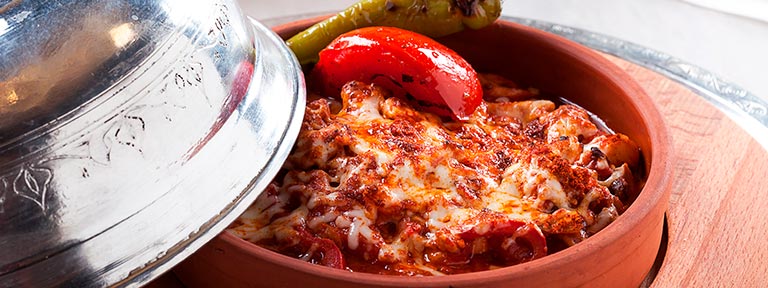Travel experiences
A taste of Turkey
23rd March, 2021
Turkey offers some of the best cuisine in the world. Annabelle Thorpe heads to Istanbul, where she discovers a vibrant city with a fascinating past and a passion for food.

In a world full of extraordinary cities there is only one Istanbul. With neighbourhoods straddling Europe and Asia, this energetic former capital is at once beguiling, frenetic and graceful. The river at its centre, the Bosphorus, is as busy as the roads that surround it: fishing and pleasure boats, cargo and cruise ships all glide through the heart of the city.
A visit to Istanbul offers the chance to glimpse Turkey’s dramatic history, from its days as Byzantium, part of ancient Greece, through its centuries as Constantinople, heart of the Ottoman Empire, to today, a 21st-century metropolis built on a spectacular past. Istanbul is a patchwork of neighbourhoods, each with their own character. Most visitors head to Sultanahmet and Beyoğlu, home to iconic sites such as the graceful Hagia Sophia and Blue Mosque and the vast Topkapi Palace and Taksim Square. Other quieter neighbourhoods offer the chance to get under the skin of the city, but what links them all is a passion for food.
Street-food stalls dot the waterfront, cubbyhole salonus (takeaways) serve fresh pide (Turkish pizza), and markets heave with fish. This is a city that runs on its stomach. Turkey is one of the world’s great food cultures and is famous for meze, an array of starters, soups, casseroles, fresh fish and sticky desserts. Any exploration of Istanbul should begin with a stroll along Istiklal Caddesi, the main street in the bustling Beyoğlu district. The Çiçek Pasaji is a great spot for lunch. This long, galleried courtyard that was once the city’s flower market is now filled with restaurants and cafés.
For something more authentic, the streets leading off the main artery are home to street-food stalls selling moreish treats. When Istanbulites aren’t eating, they’re shopping. The Grand Bazaar is the largest covered market in the world and the place for ceramics, silk throws and silver jewellery – with bartering skills a necessity. It’s also fantastic for people-watching; locals love to sit and gossip over thimblefuls of coffee and sticky baklava before dipping into the neighbouring spice market, a riotous mix of noise, colour and scents rising up from the neat pyramids of cumin and saffron, barrels of star anise and dozens of varieties of olives.
To really understand Istanbul, take the 25-minute ferry ride from Eminönü or Karaköy on the European side to Kadıköy, gateway to the Asian half of the city. The area’s fish market is packed with excellent restaurants and many of them specialise in hamsi, a small anchovy fish from the Black Sea. But perhaps the greatest pleasure in Kadıköy is to head to a waterfront tea garden and order a tulip-shaped glass of cay – a rare moment of quiet in this intoxicating city.
Tuck into these Turkish delights
Gözleme

Turkey’s favourite street food, these thin pancakes are cooked on a hot circular stone and filled with feta and parsley, mince or potatoes.
Imam Bayildi

Translated as ‘the priest fainted’, this stuffed aubergine dish can feature as a veggie option or be filled with mince. Either way, it’s divine.
Menemen

This dish of scrambled eggs with tomatoes, peppers and onions and thick with olive oil is a classic Turkish breakfast staple.
Köfte

These spiced lamb meatballs are everywhere from street-food stalls to upscale restaurants. Best eaten as a mega sandwich with onions and tomatoes.
Güveç

The Turkish equivalent of casserole, this can be made with chicken, lamb or prawns and is usually served in an earthenware bowl.
Baklava

Oozing with syrup and pistachio crumbs, this dessert is the ultimate sweet treat, best taken with a thimble of Turkish coffee.
Discover Turkey
Try some of these culinary delights on our Istanbul: City of Empires tour.
The opinions expressed are those of the author and are not held by Saga unless specifically stated.
The material is for general information only and does not constitute investment, tax, legal, medical or other form of advice. You should not rely on this information to make (or refrain from making) any decisions. Always obtain independent, professional advice for your own particular situation.





